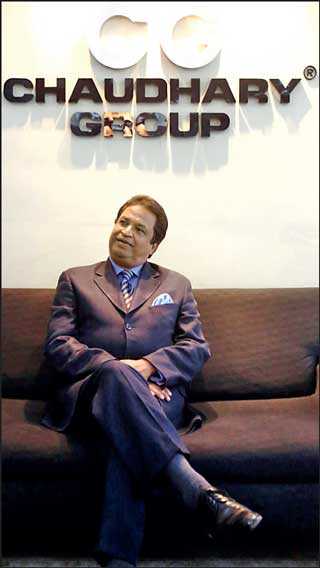Tuesday Feb 17, 2026
Tuesday Feb 17, 2026
Wednesday, 3 July 2019 00:00 - - {{hitsCtrl.values.hits}}
NEW DELHI (Reuters): Nepal’s Chaudhary Group (CG) has signed a deal worth about $ 100 million with China’s Huawei Technologies to bring 4G phone services to the country, CG’s chief executive said, shrugging off US security concerns about Huawei’s products.
 |
File Photo: Nepal’s only billionaire Binod Chaudhary, whom Forbes valued at a billion dollars in March, gestures as he speaks with Reuters during an interview at his office at Chaudhary Group in Kathmandu 4 October 2013 – Reuters
|
Aiming to shake up Nepal’s mobile phone market as Reliance Industries Ltd.’s Jio has done in India, CG planned an initial $ 250 million investment in the new 4G network, Chairman Binod Chaudhary said in an interview.
It will include free voice services but focus on data, online payment and other services, he said.
After starting out selling noodles in India and later across Asia, his family-owned conglomerate now includes a bank, a telecommunications business – providing rural telephony – and dozens of resorts, including two in the Maldives in partnership with India’s Taj Group.
Chaudhary, Nepal’s only billionaire with a net worth of $ 1.7 billion, according to Forbes magazine, has overseas noodle manufacturing factories in India, Serbia and Bangladesh, a hedge against the uncertainties of his landlocked country.
Huawei would supply equipment worth about $ 100 million for the launch of 4G services, which could later be upgraded to 5G, said Chaudhary, 64, who is also a lawmaker.
“Huawei has been working with the state-owned telecom company, and now they will be working with us,” he said adding Nepal would ensure that business considerations were paramount when deals were made with companies from neighbouring countries.
Huawei Technologies is a major competitor for 5G equipment deals around the world, but the United States has asked allies to reject Huawei technology, arguing that it could be vulnerable to Chinese eavesdropping.
Huawei denies its equipment is a security risk.
Chaudhary said CG Group has entered into a deal with Lifecell, a subsidiary of Turkey’s Turkcell, for technical and design services, with Huawei providing the infrastructure.
“I don’t see any problem in collaboration with Chinese companies,” he said, adding he was also planning to set up a venture in the cement sector with a Chinese manufacturer.
CG is already running a limited telecommunications services in rural areas in Nepal.
Min Prasad Aryal, a spokesman for Nepal’s telecom regulator, said CG group has applied for a license for a much wider network including cities.
“If they meet the standard specified by us we have no objection,” he said when asked whether CG would get permission even if it used Huawei equipment.
With a population of about 30 million, the land-locked country has near 100% mobile penetration and about 50% for data services.
Nepal Telecom is the market leader with a 51 per cent market share by subscribers, followed by Ncell and Smart Cell, according to industry estimates.
“We are confident to achieve one third market share in three-to-four years’ time as we will have an advantage to bring in the latest technology,” Chaudhary said.